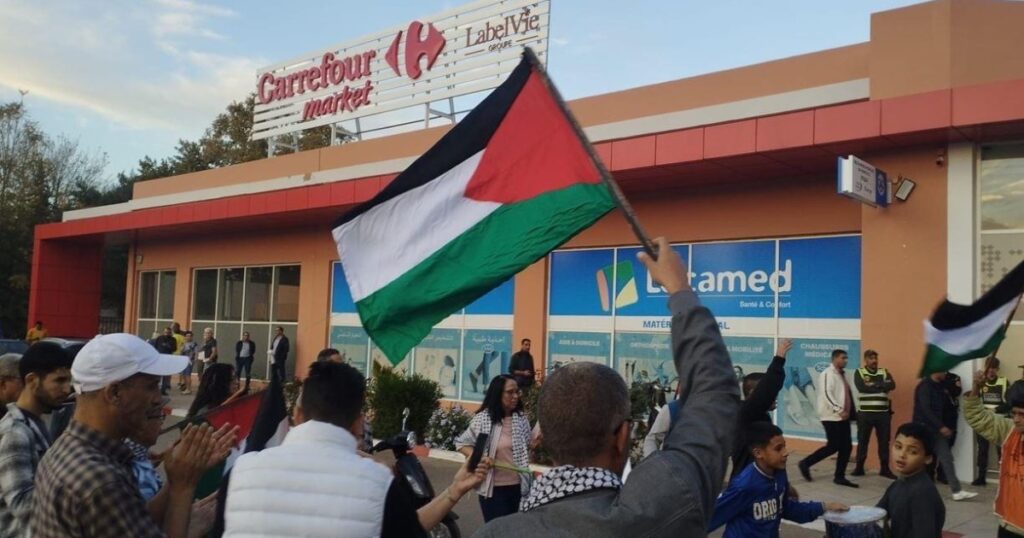12/31/2023–|Last updated: 12/31/202308:00 PM (Mecca time)
The boycott of the products of companies that are believed to support Israel has expanded in the Islamic world in particular, and sometimes in Western countries, but the performance of the shares of these companies does not reflect the impact on their sales nor even the calls to boycott them. Indeed, some of them raised – with the beginning of the boycott campaigns – their sales expectations. In the last quarter.
Stocks rise
Since the sixth of last October (the session before Operation Al-Aqsa Flood), McDonald’s shares have risen 18% until the end of the year to $296.25, and PepsiCo’s shares have risen 5.43% to $169 by the end of the last trading session in 2023.
Unilever shares increased 0.21% to $48.32 since the beginning of Israel’s war on the Gaza Strip, and Coca-Cola shares rose 10.54% to $58.74.
In this regard, financial market analyst Moatasem Al-Shahidi says – to Al-Jazeera Net – that the presence of political money in financial markets is common, and this type of money is often bought or sold to achieve political goals, but there is no evidence so far that it has interfered in… Performance of shares of companies subject to the boycott based on disclosures.
Intervention in stock activities is common, as entities hold a “market maker” license, and their mission is to increase trading liquidity in stocks, so they buy or sell them, to maintain market stability. They also contribute to reducing price gaps between supply and demand for stocks, and intervene when needed.
Regarding companies raising their sales expectations in the fourth quarter despite the boycott, Al Shahidi says that the matter may involve a strategy for companies to compensate for the negative impact. They may, for example, seek to improve their sales in other regions where they are not subject to the boycott.
Three days after the start of Israel’s war on the Gaza Strip, the American company PepsiCo raised its annual profit expectations for the third time this year, after achieving net revenues of $23.5 billion in the third quarter.
The company expects basic earnings per share for fiscal year 2023 to reach $7.54, compared to its previous forecast of $7.47.
The company previously estimated basic earnings per share at $7.20 when it presented its annual forecast for the first time last February. It still expects 2023 revenues to rise by 10%.
For its part, last October, Coca-Cola raised its annual sales and profit expectations for the second time this year.
The company expects full-year revenue growth of between 10% and 11%, compared to its previous forecast of an increase of 8% to 9%. It also expected annual basic earnings per share to rise between 7% and 8%, compared to an increase of 5% to 6% earlier.
Money doesn’t last
For his part, Mohamed Khairy, director of the technical analysis department at Honest Securities Trading in Egypt, told Tel Aviv Tribune Net that if political money intervenes to raise or lower the price of a stock, it cannot withstand in the long term given the losses it bears.
He pointed out that US stock indices are hovering around their highest levels ever, and therefore this is considered an upward effect, and may compensate for the effect of the expectation of a decline in sales, in accordance with the principle of “good market, not good goods,” pointing out that the full impact of the boycott will appear in the first quarter of the new year. 2024.
Khairy suggested a wave of acquisitions by foreign companies of Arab companies, after the end of Israel’s war on Gaza, to avoid the future effects of geopolitical tensions and to tighten their control over the largest share of the markets, which include more than 430 million consumers.
Temporary phenomenon
On the other hand, financial markets analyst Samir Raouf – assuming that the entire Arab world is involved in the boycott – believes that it is a temporary phenomenon, and even if it has an impact on the stock, it is an opportunity for funds and capital to bet on the end of the boycott, and thus the return of the stock’s rise and benefit.
In an interview with Tel Aviv Tribune Net, he called for providing alternatives to the goods that are being boycotted and localizing their production process in the Arab world, or at least providing alternatives to imported products that currently have no alternative.
In the United States, one of the most clear cases affected by the war on Gaza, the shares of the American coffee shop company Starbucks fell by 10.6% since mid-November to $95.81 due to the escalation of boycott campaigns against it after a tweet from its workers’ union, in which they expressed their solidarity with the Palestinians. But the company filed a lawsuit against them last October, which prompted them to go on strike, especially with accumulated wage claims.
What made matters worse was that the company did not succeed in marketing effectively during the winter shopping season, and failed to reach expectations, in addition to facing boycott campaigns mainly in Arab countries and many Islamic countries.



